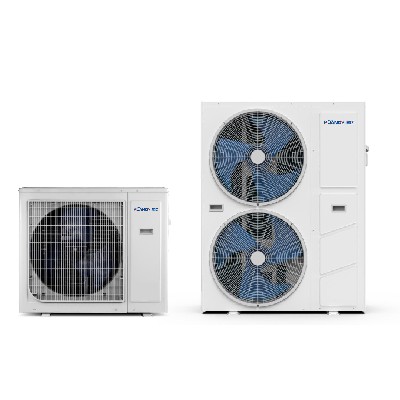How to maintain household variable frequency heating and cooling units
Regular cleaning and maintenance: The unit schedule includes cleaning important components such as condensers and evaporators to maintain good working conditions and energy efficiency. Advocate for cleaning and maintenance at least once a year, or add maintenance frequency appropriately according to the usage environment and frequency.
Regularly check the pipeline connection: Check whether the pipeline connection is firm and sealed to prevent leakage and damage. Especially for units with longer service life, it is necessary to regularly check for leaks at the pipeline connection and promptly correct or replace damaged pipelines.
Adhere to appropriate humidity: During use, maintain indoor humidity within the appropriate range to prevent discomfort caused by excessive dryness or humidity. If the indoor humidity is too low, a humidifier can be used for humidification, but it is important to regularly replace the humidifier filter.
Reasonable operation time: Control the operation time according to the actual situation to prevent equipment overheating or wear caused by long-term continuous operation. During winter use, the operating time should be adjusted appropriately to prevent continuous operation in high temperature environments and to prevent affecting the lifespan of the equipment.

Regular protection and maintenance: Regularly inspect and protect internal components of the unit, such as compressors, motors, etc., promptly correct faults and replace damaged components to ensure the normal operation of the equipment. If any abnormal operation or malfunction prompts are found, the equipment should be immediately shut down and professional maintenance personnel should be contacted for maintenance.
Record operating data: Record the operating data of the equipment, such as temperature, humidity, energy consumption, etc., for analysis and adjustment. Able to install corresponding data recorders or use mobile apps and other devices to facilitate understanding of device operation and energy efficiency.
Operation: Pay attention to protection during operation to prevent direct contact with high-temperature components, electric shock, and mechanical damage. During the application process, attention should also be paid to preventing excessive reliance on automatic control. In case of abnormal situations, the power should be cut off in a timely manner and corresponding measures should be taken.
Train operators: Provide relevant training to operators to understand the equipment operation and protection regulations, and ensure the correct use and protection of household variable frequency heating and cooling units.
Article source: Household variable frequency heating and cooling unit factory www.jxnp.com.cn
-
07-07
What are the industry standards for household variable frequency heating and cooling units
GB 4706.1-2005 "Safety of Household and Similar Electrical Appliances - Part 1: General Requirements": This standard specifies the safety requirements for household and similar electrical appliances,
-
07-07
What is the difference between air powered water heaters and regular water heaters
The operating principle is different: an air energy water heater uses the heat energy in the air to heat the water in the water tank, while a general water heater uses an electric heating rod to direc
-
07-07
What issues should be noted for high and low temperature cooling and heating units used in transportation
Packaging and maintenance: Commercial high and low temperature cooling and heating units require proper packaging to prevent impact, vibration, rain, humidity, and other factors during transportation
-
07-07
What should be noted when designing a household variable frequency heating and cooling unit
Protectiveness: Household variable frequency heating and cooling units are required to comply with relevant national standards and have protective functions such as anti electric wall and anti dry bur

